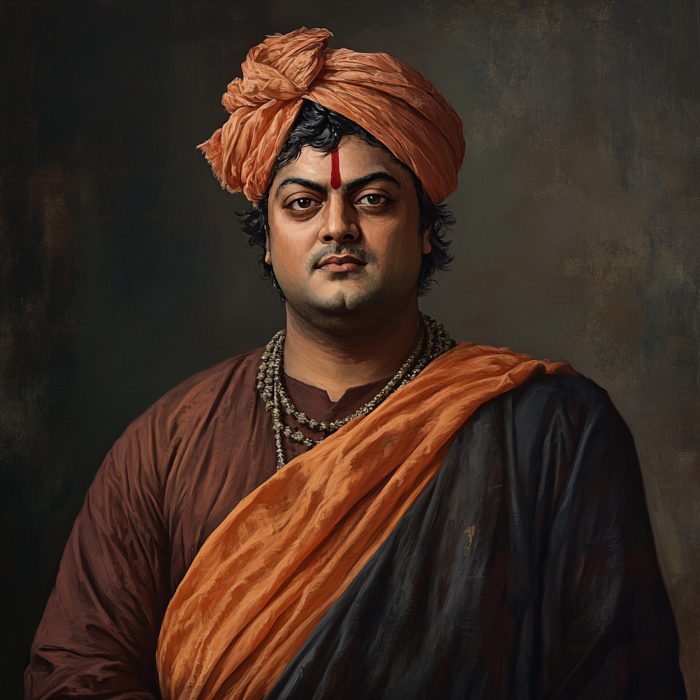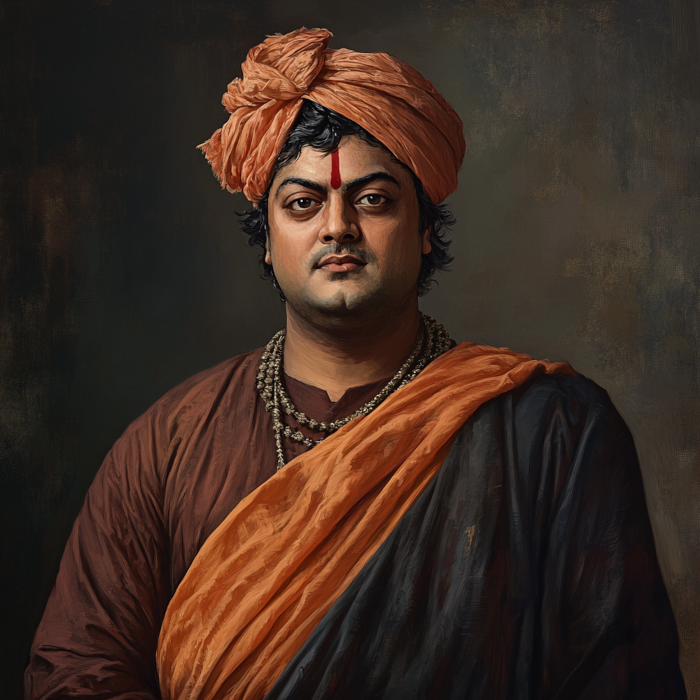


Swami Vivekananda (1863–1902) was an Indian monk, spiritual leader, and key figure in the introduction of Vedanta and Yoga to the Western world. He was a disciple of Sri Ramakrishna and the founder of the Ramakrishna Mission. He is best known for his inspiring speech at the World’s Parliament of Religions in Chicago in 1893, where he began his address with the famous words, "Sisters and brothers of America," winning immediate applause for his message of unity and religious tolerance. Swami Vivekananda played a significant role in reviving Hinduism in India, encouraging national pride, and serving as an inspiration to the freedom movement. His teachings emphasized the potential for human beings to realize their divine nature and serve humanity.
Birth and Family Background: Swami Vivekananda was born as Narendranath Datta on January 12, 1863, in Calcutta (now Kolkata), in British India. He was born into an aristocratic Bengali family. His father, Vishwanath Datta, was a successful attorney known for his progressive views, and his mother, Bhuvaneshwari Devi, was deeply religious. Narendranath was a precocious and inquisitive child with a keen interest in spirituality from an early age.
Education and Spiritual Quest: Vivekananda was educated at Presidency College and Scottish Church College in Calcutta, where he studied philosophy, religion, history, and Western logic. He excelled academically, and his education exposed him to both Indian and Western philosophical traditions. Despite his success in academics, he had a deep spiritual longing and searched for answers to existential questions, including the nature of God and the purpose of life. He met several religious leaders but was not satisfied until he met Ramakrishna Paramahamsa, a mystic and priest at the Dakshineswar Kali Temple near Calcutta.
Disciple of Ramakrishna: Vivekananda met Sri Ramakrishna in 1881, and the meeting transformed his life. Ramakrishna became his spiritual mentor and introduced him to Advaita Vedanta, which teaches the unity of all existence and the divinity within every individual. Ramakrishna's profound spiritual experiences and devotion to the Divine Mother greatly influenced Vivekananda. He initially doubted Ramakrishna’s teachings, but after spending more time with him, Vivekananda experienced a deep spiritual awakening.
Ramakrishna’s Passing and the Formation of the Monastic Order: After Ramakrishna’s death in 1886, Vivekananda and other disciples took monastic vows and formed a small monastic community in Baranagar. Vivekananda, who was deeply moved by the suffering of the poor and downtrodden, began traveling across India, witnessing the dire conditions faced by many people. These travels made him realize the need to uplift India’s masses through spiritual as well as social and educational initiatives.
Journey to the West (1893): In 1893, Vivekananda traveled to the United States to represent India at the World's Parliament of Religions in Chicago. He wanted to share the teachings of Vedanta and speak about the importance of universal tolerance and the unity of all religions. His journey to the West was funded by the support of his admirers, including Maharaja Ajit Singh of Khetri.
Speech at the World’s Parliament of Religions: On September 11, 1893, Swami Vivekananda delivered his iconic speech at the Parliament of Religions, which began with the words: "Sisters and brothers of America." His message of religious tolerance, mutual respect, and the essential unity of all faiths was met with thunderous applause. Vivekananda emphasized that every religion is a valid path to the divine and that differences in belief should be celebrated as diverse ways of realizing the same truth. His eloquence and powerful presence captivated the audience, making him a prominent figure in Western spiritual circles.
Lectures in the West: Following the Parliament, Vivekananda gave numerous lectures across the United States and later in Europe, spreading the teachings of Vedanta and Yoga. He founded the Vedanta Society of New York in 1894, which was among the first institutions to promote Eastern spirituality in the West. His lectures focused on subjects such as universal religion, self-realization, and the potential of the human spirit. Vivekananda’s teachings resonated with Western audiences, who were drawn to his message of inner transformation, social service, and spiritual unity.
Return to India (1897): Swami Vivekananda returned to India in 1897 as a national hero, having gained significant fame in the West. He received a warm welcome, and his return sparked a sense of national pride among many Indians. He saw the need for spiritual upliftment as well as social and educational reform in India and worked tirelessly to spread his message of self-confidence and service to humanity.
Founding of Ramakrishna Mission: In 1897, Vivekananda founded the Ramakrishna Mission, a spiritual and humanitarian organization dedicated to promoting education, healthcare, social welfare, and the teachings of Sri Ramakrishna. The Ramakrishna Mission's motto, inspired by Vivekananda's ideals, is "For one’s own salvation and for the welfare of the world." The mission carried out a wide range of activities, including relief work, education, and healthcare, and it aimed to apply spiritual principles in service to society. It became an important institution in promoting education, social reform, and spiritual awareness in India.
Belur Math: Vivekananda also established the Ramakrishna Math at Belur, near Calcutta, as a monastic order for the members of the Ramakrishna Mission. The Math became the center for training monks and a hub for spiritual activities, providing a place for individuals to learn and practice the teachings of Vedanta.
Advaita Vedanta and Universalism: Swami Vivekananda was a key proponent of Advaita Vedanta, which asserts that the true self (Atman) is identical to the ultimate reality (Brahman). He believed in the inherent divinity of every human being and emphasized that realization of this divinity is the ultimate purpose of human life. His teachings encouraged individuals to look beyond differences and recognize the essential unity of all beings.
Service to Humanity as Worship: Vivekananda placed great emphasis on karma yoga—the path of selfless service. He taught that serving others is equivalent to worshipping God, as divinity resides in all beings. He often said, "Service to man is service to God," encouraging his followers to engage in social work and uplift the poor and marginalized.
Nationalism and Empowerment: Vivekananda was one of the earliest leaders to speak of national pride and self-reliance in India. He sought to awaken the Indian people to their own cultural heritage and instill in them the confidence needed to overcome colonial subjugation. He believed that spirituality, combined with education and social reform, could empower the masses and lead to the regeneration of India.
East and West: Vivekananda believed in bridging the gap between Eastern and Western cultures. He admired the material progress and scientific achievements of the West but felt that it lacked spiritual depth. Conversely, he believed that India, rich in spiritual tradition, could benefit from Western advancements. He envisioned a synthesis of Eastern spirituality and Western material progress, where both would complement each other to bring about a harmonious society.
Revival of Hinduism: Swami Vivekananda played a crucial role in the revival of Hinduism in India during the late 19th and early 20th centuries. He reinterpreted Hindu philosophy in a modern context, making it accessible and relevant to both Indians and Westerners. He emphasized that Hinduism is not just a set of rituals, but a universal spiritual tradition that encompasses the truths found in all religions.
Influence on Indian Nationalism: Vivekananda's teachings inspired many leaders of the Indian freedom movement, including Mahatma Gandhi, Subhas Chandra Bose, and Jawaharlal Nehru. His message of self-confidence, unity, and service to the nation resonated deeply with those who were working towards India's independence. He is regarded as one of the early visionaries of Indian nationalism.
Inspiration for Generations: Swami Vivekananda’s teachings continue to inspire people around the world. His emphasis on realizing one’s potential, cultivating compassion, and contributing to society remains deeply relevant today. His birthday, January 12, is celebrated in India as National Youth Day in recognition of his inspirational impact on young people. The Ramakrishna Mission and its affiliated organizations continue his work in promoting education, healthcare, and spiritual growth.
Books and Works: Swami Vivekananda’s teachings and lectures were compiled into several volumes, including "The Complete Works of Swami Vivekananda." His famous books, such as "Raja Yoga," "Jnana Yoga," and "Karma Yoga," have had a lasting impact on spiritual seekers and scholars. His message emphasized that every human being has the potential to attain greatness and that true spirituality lies in recognizing and realizing that potential.
Swami Vivekananda was a visionary spiritual leader, reformer, and patriot whose influence reached far beyond India’s borders. He was instrumental in bringing the teachings of Vedanta and Yoga to the West and promoting the idea of universal tolerance and unity among religions. His emphasis on service to humanity, the empowerment of the individual, and the recognition of the divinity within all beings continues to inspire millions of people worldwide.
Vivekananda’s message of self-realization, service, and unity transcended religious, cultural, and national boundaries, making him one of the most significant spiritual figures of the modern age. His legacy lives on through the work of the Ramakrishna Mission, his writings, and the countless individuals who draw inspiration from his life and teachings to work toward the betterment of themselves and the world.

We use cookies
We use cookies and other tracking technologies to improve your browsing experience on our website, to show you personalized content and targeted ads, to analyze our website traffic, and to understand where our visitors are coming from. Privacy Policy.